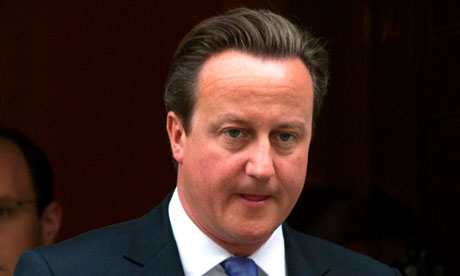
David Cameron used the Falkirk row at Wednesday's prime minister's questions on the advice of Lynton Crosby. Photograph: Rex Features
If you want to distract attention from a beam in your own eye, it pays to complain noisily about the mote in your neighbour's. And that, in a nutshell, is what's been happening at Westminster for the last three days.
This could have been a humiliating week for David Cameron, forced to feign good humour as his backbenchers first forced through an expensive commitment to tax breaks for marriage and then lashed him to the mast of a European referendum he doesn't want. What saved him was Labour helpfully launching itself into a battle to the death with its biggest union sponsor. One civil war eclipsed the other.
The Falkirk affair is a battle Ed Miliband had no choice but to fight. Unions shouldn't automatically expect seats for their people, any more than corporate donors should expect peerages for theirs, and the details that have emerged from this particular selection battle are shocking ? if not terribly surprising.
But the Labour leader now risks getting bogged down in a far bigger war, with no obvious exit strategy. A winnable and, so far as voters were concerned, relatively uninteresting power struggle over selections has snowballed into a massive punch-up with Unite leader Len McCluskey which raises questions over the future of the union link and over Miliband's personal authority. Hoary old tropes about Labour being helplessly in hock to unions are being revived alongside the sensitive question of Miliband's legitimacy as leader, given the perception that it was Unite wot won it for him.
Lynton Crosby, on whose advice Cameron apparently decided to turn Falkirk into a crudely polarising issue at Wednesday's prime minister's questions, is certainly justifying his generous salary. Somehow Cameron has ended up looking strong despite caving in to his own backbenchers, while Miliband is branded weak for standing up to a powerful vested interest (albeit a donor which, as Diane Abbott suggested on Friday, has nowhere else to take its millions).
One senior Conservative minister said cheerfully it was starting to feel "like 1992 all over again", when an unpopular government clung on by managing to make the alternative look infinitely worse. What we've seen this week is a dry run of the 2015 election campaign, road-testing Cameron's key lines of attack on Miliband, and Labour MPs will not be encouraged by how confused the party's response has been.
Even after Tom Watson's surprise resignation on Thursday, the leadership was still arguing that there was nothing much to see here. The unflappable Angela Eagle was sent out on Friday morning to argue it was simply a matter of infringements of the Labour rule book, and nobody's business but the leader's.
Yet by lunchtime that line was already unravelling, with Abbott telling the BBC's Daily Politics that she'd seen no evidence Unite had even broken party rules as they stood at the time of the selection. By mid-afternoon, Labour had called in the police, ratcheting things up still further. Each new line seems to contradict the last: it's tempting to think that one of the reasons the Labour leader held on to his old consigliere Tom Watson when the latter first offered to resign is that Watson, for all his flaws, can organise his way out of a paper bag. So the task for the leader now is to focus on what matters most to voters.
There's a chance here for Labour to talk about opening politics up to people from all walks of life who currently never get a chance because winnable seats are stitched up for insiders from the start. McCluskey is right that it's unhealthy for politics to be dominated by ex-advisers with good shadow cabinet connections, but cramming it with people who know the right union leaders isn't much better. Miliband has already asked MP Jon Trickett to look at ways of getting more working-class Labour candidates elected and several Labour MPs also want him to examine open primaries, where ordinary people are drawn into the selection process.
Many ordinary union members meanwhile long for Labour to defend them, to make clear that there's nothing shifty about unions lobbying political parties and nothing wrong with standing up for the workers. Ed Miliband did say on Friday that he was "proud" of the millions of shop workers and bus drivers who belonged to Unite, but it may be hard for Labour to talk about the good unions do in public life until it's seen to have cleaned out the stables properly.
Similarly, some on the Labour right see a chance here to reduce union influence or renegotiate the relationship. But that would be Christmas come early for Cameron, ensuring the vexed question of Miliband's relationship with the unions remains up in lights all the way through to the election. The really big challenge for Labour is whether it can get back to the question of who's really running the Conservative party.
Source: http://www.guardian.co.uk/politics/2013/jul/05/labour-union-row-distraction-tories
10 year old gives birth c. difficile carmelo anthony nurse jackie nurse jackie peeps nhl playoffs
No comments:
Post a Comment